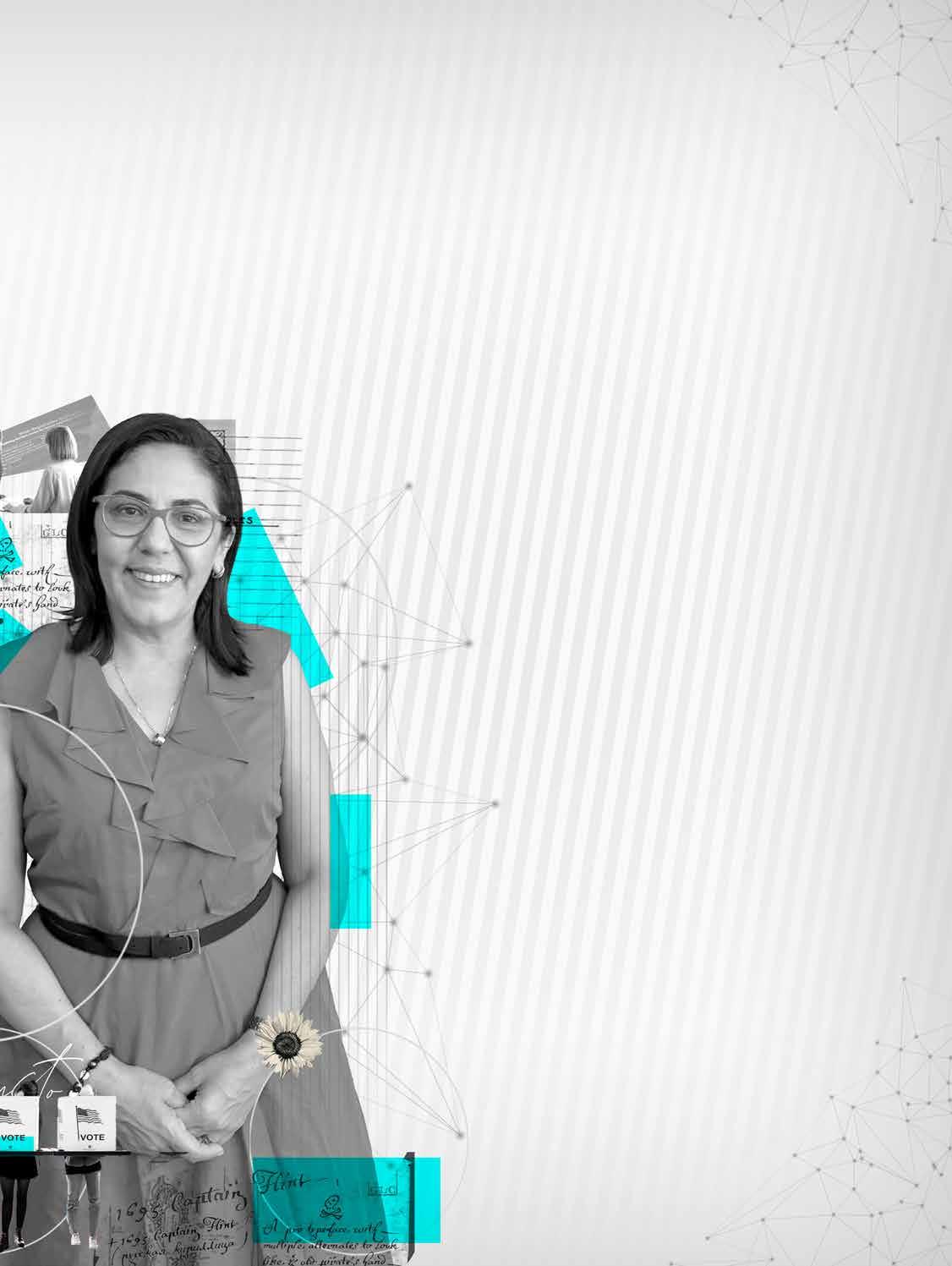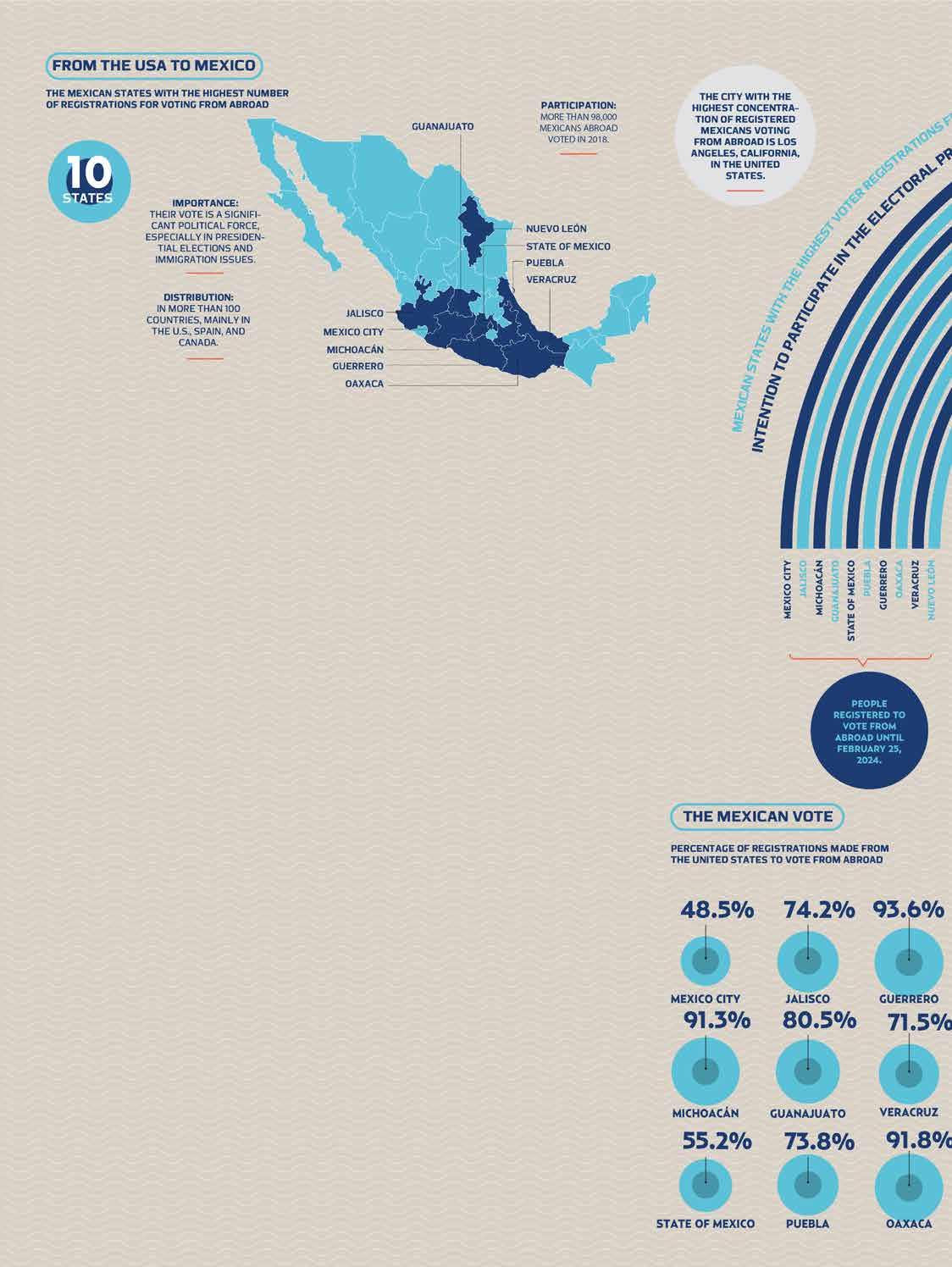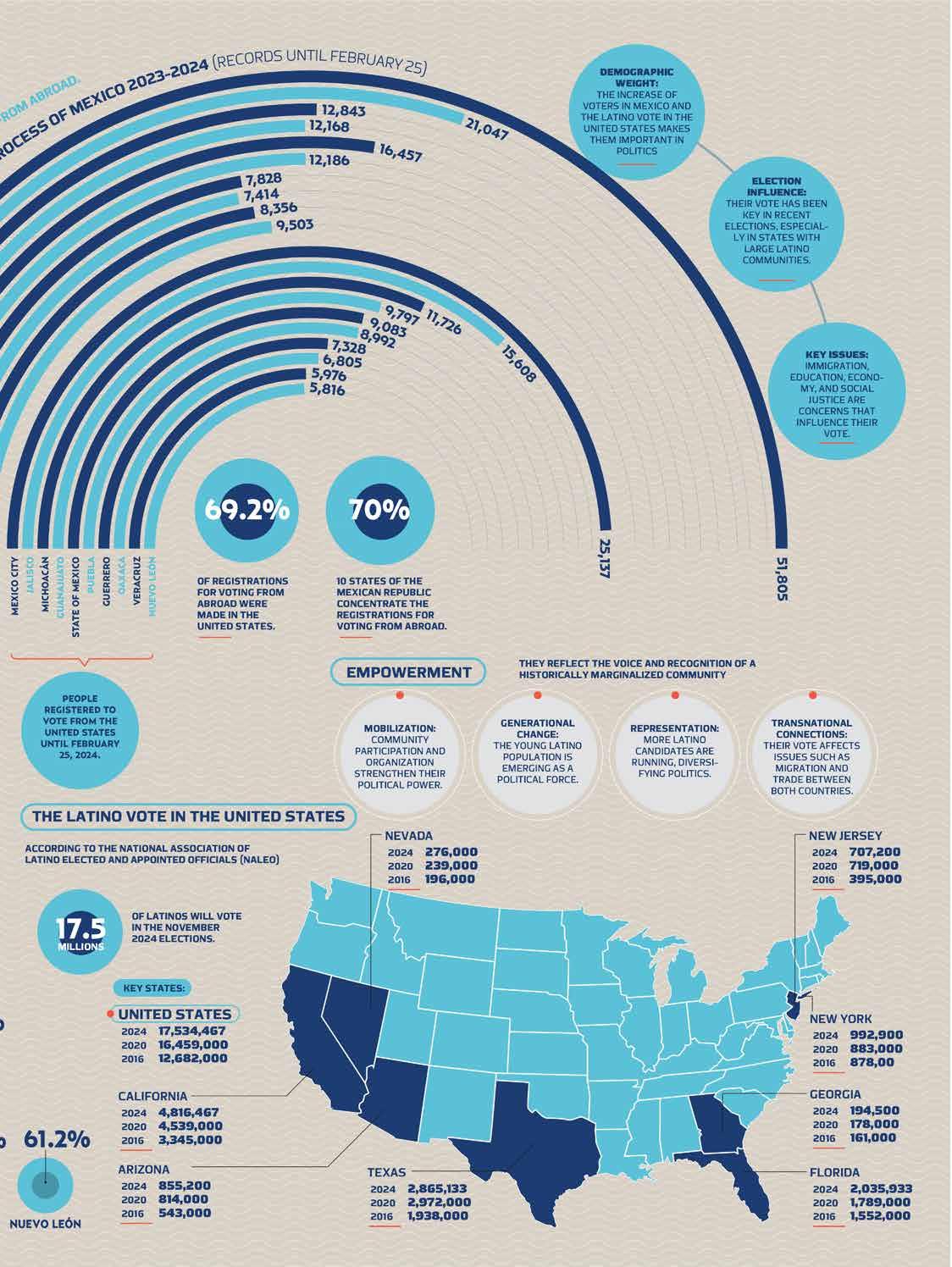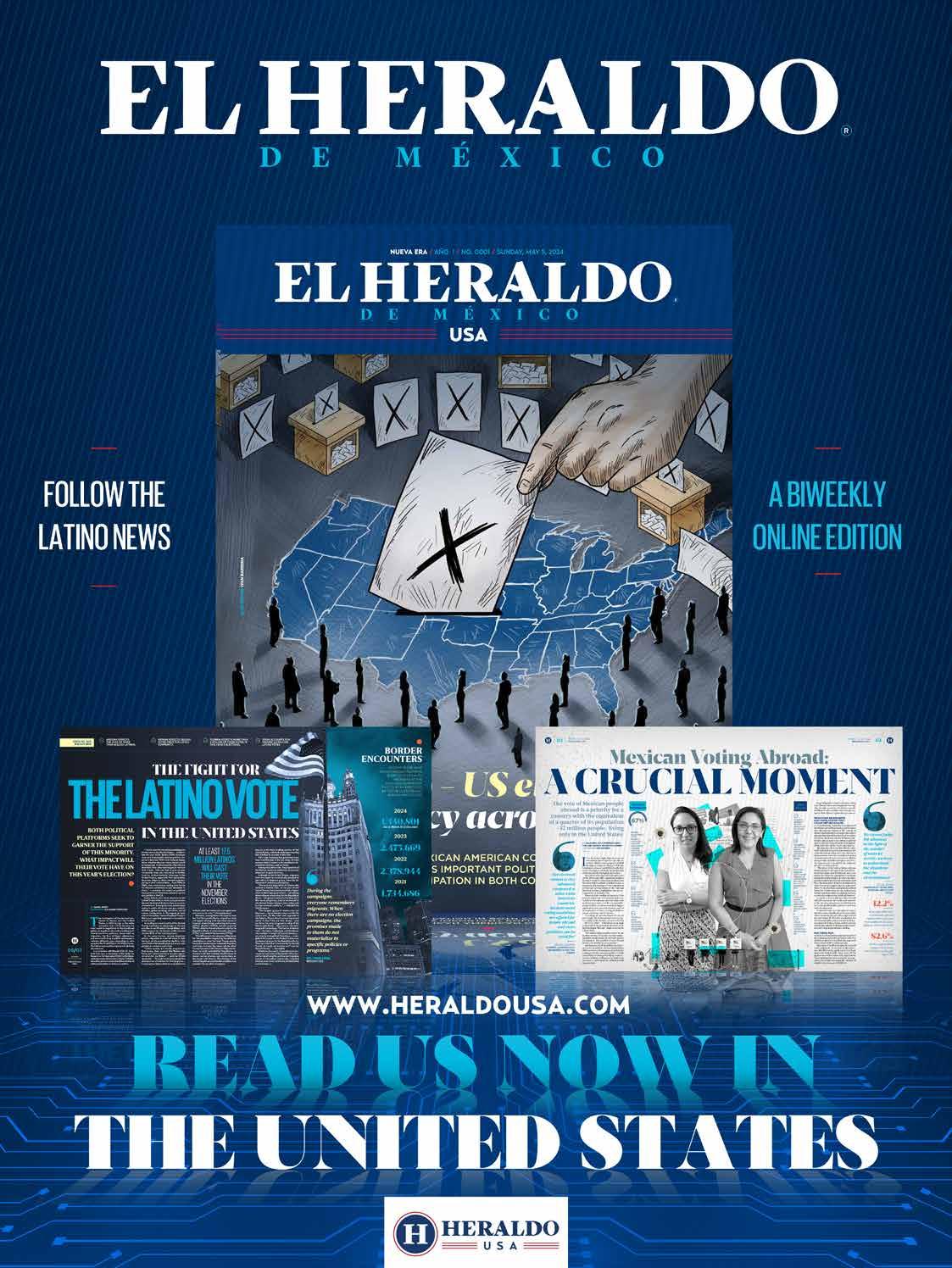

Mexico - US elections Democracy across borders
THE MEXICAN AMERICAN COMMUNITY HAS IMPORTANT POLITICAL PARTICIPATION IN BOTH COUNTRIES.
Mexican Voting A CRUCIAL
The vote of Mexican people abroad is a priority for a country with the equivalent of a quarter of its population -37 million people- living only in the United States.

Our electoral system is very advanced compared to other Latin American countries, because more voting modalities are offered for people abroad and more positions can be voted for.’
DR. LUICY PEDROZA ACADEMIC COORDINATOR OF THE MASTER'S IN POLITICAL BY ALEJANDRA ICELA MARTÍNEZ RODRÍ-
BY ALEJANDRA ICELA MARTÍNEZ RODRÍ-
GUEZ AND PATRICIA TEPOZTECO ROMERO
ILUSTRATION: IVAN BARRERA
It’s a hard-won right that the overseas community has fought for decades to achieve. While it was recognized in 1996 through a reform to Mexico’s Political Constitution, it wasn’t until 2006 that the first exercise took place, limited to the presidential election and only through postal voting.
Since then, after three electoral processes (2006, 2012, and 2018), significant progress has been made in exercising political and electoral rights abroad. Claudia Zavala, a counselor and member of the Commission of Mexicans Living Abroad of the National Electoral Institute (INE), highlighted various advancements to Heraldo USA.
These include voter ID issuance from abroad, expansion of elected positions to include senatorial seats, governorships, and parliamentary seats, as well as increased dialogue with the aboard community, higher registration rates for each election, and the incorporation of three voting modalities: postal, electronic, and in-person.
According to Counselor Zavala, it’s crucial not to judge the democratic process’s progress solely by the number of votes received — 98,470 in 2018 — which may seem small compared to the potential universe of 26 million eligible Mexican-origin voters in the United States.
“We cannot judge progress solely by the number of votes we receive. We must understand the circumstances to motivate greater participation. The number of votes should motivate us to reinforce our actions.”
Furthermore, the National Electoral Institute views the political-electoral participation of the overseas community as more than just casting a vote. It’s an ongoing effort to build citizenship, involving networking, early education on Mexico’s democratic model, and outreach to individuals not affiliated with organizations.
67%
average participation of the Mexican community abroad in the previous 3 federal elections (2006, 2012 and 2018).
44,788 more people registered to vote compared to the 2018 process.
In 2006 and 2012, votes from abroad favored the right-wing party (PAN), and in 2018 the leftwing party (MORENA).
74 million pesos more were allocated in this electoral process than in 2018.
Voting Abroad:
MOMENT
Regarding future steps in Mexican voting from abroad, efforts are being made to recognize the right to vote for municipal councils, and there is still a need for nine states to recognize their citizens’ right to elect governors.

37 million people of Mexican origin live in the United States (2020).
11.7 million people were born in Mexico and migrated to the United States.
1,529,733 people have voter ID processed abroad (April 30). 26 million Mexican American people living in the United States are over 18 years old, equivalent to 69%. 187,388 people have registered to vote from abroad (April 30).
MEXICO HAS AN ADVANCED ELECTORAL SYSTEM THAT COULD FURTHER EVOLVE.
Dr. Luicy Pedroza, Academic Coordinator of the Master’s in Political Science at the Center for International Studies of the College of Mexico, highlights Mexico’s progressive nature in guaranteeing political and electoral rights. However, she notes that the Mexican community abroad aspires to and has fought for special political representation for a long time, often referred to as the “sixth constituency.”
She mentions that countries like Ecuador and Colombia have special representation for residents abroad, a feat yet to be achieved in Mexico. Some countries even have regional representations. France, for instance, divides its expatriates into different regions, and elected representatives speak for the migrants’ interests in those regions.
“This is one of the most ambitious reforms that would have to be made to the Law of Electoral Procedures and Institutions and it is a banner for which the community of residents abroad has fought for about 30 years, they have asked for that extraterritorial constituency and not it has been given. It has been proposed at least 3 times in Congress but not approved. There we need to have an important political battle, but I believe that it is the political way to represent them while recognizing that it is a community with particular needs and interests”.
In practice, this would mean that elected officials represent the needs and interests of the diaspora population, translating into laws and specific public policies to promote their development.
It's also necessary to create spaces to ensure the full exercise of political and electoral rights of the community abroad, as these rights extend beyond voting. Dr. Pedroza emphasizes the need to reopen discussions on such participation spaces to foster a strong, united community capable of influencing the country beyond voting and remittance sending.
ELECTIONS 2024
In 2024, the National Electoral Institute (INE) faces the largest elections in history, with over 20,000 positions to be filled and a general electoral roll of 98.5 million people.
More than 1.5 million people abroad hold valid credentials. At the time of this reportage, 187,388 voting applications had been approved. Additionally, there were 39,754 applications under review, with expectations that a significant number would be incorporated, potentially increasing the number of eligible voters to over 200,000.

We cannot judge the advances in the light of the number of votes we receive, we have to understand the situations and the circumstances."
CLAUDIA ZAVALA COUNSELOR AT THE
INSTITUTE OF MEXICO. of people with voter credentials abroad registered to exercise their political-electoral rights in 2024 (April 30). of the registrations made to vote from abroad were successful (Up to April 30)
12.2% 82.6%


in a context where anti-immigrant state laws are still being passed, as recently promoted in Texas, kinds of activities allows people to get to know Mexicans; it helps break prejudices due culture is a tool that diplomatic migrants share with those who have fought throughout our history their struggle is evident every day in people , Chait pointed out. Mexican tenor Leonardo Sánchez, will be part of the artists performing this May 5 in New ensures that this date is an opportunityfluential nations in the world, but at the same he U.S. has its taco Tuesday, they love guacamole, our music... Mexicans possess a very strong
ARIZONA EXPECTS THE VOTE OF MORE THAN 855,000 LATINOS.
NEVADA ANTICIPATES 280,000 VOTES FROM THE LATINO COMMUNITY.
FLORIDA AWAITS MORE THAN 2 MILLION OF THESE VOTES IN THIS YEAR’S ELECTIONS.
THE LATINO VOTE THE FIGHT FOR IN THE UNITED
BOTH POLITICAL PLATFORMS SEEK TO GARNER THE SUPPORT OF THIS MINORITY. WHAT IMPACT WILL THEIR VOTE HAVE ON THIS YEAR’S ELECTION?

The convergence of the electoral processes in Mexico and the United States in 2024 brings to the table scenarios that will be decisive for what could be negotiated in the binational sphere among those who end up holding both federal executive positions. Issues such as migration, the flow of illegal substances, and arms trafficking would be addressed in radically different ways depending on who occupies the Oval Office in the White House. The Latino vote could be important in defining the outcome.
In an interview with Heraldo USA, Dr. Estefanía Cruz Lera, a researcher at the Center for Research on North America (CISAN) at the National Autonomous University of Mexico (UNAM), shared key points to understand the evolution of Latino participation in American politics.
“The key year for the political participation of Mexicans in the United States... is definitely the year 2006. Before 2006, Mexicans were very interested in Mexican politics. Especially between 1996 when debates began about whether Mexican votes abroad would be recognized. At this moment, when Mexico abandons this ultra-sovereigntist rhetoric that it had... that you had to give up your citizenship when you naturalize in another country, at that moment, Mexicans in the United States, especially first-generation Mexicans, began to show interest in participating in their communities... from 1996 to 2006, they were always raising their hands for Mexican politicians to pay attention to them.” – narrates the expert on political incorporation of minorities and party system and politics in the US.
Some believe that these elections in the United States reflect a more acute partisanship and ideological division than in any previous election. Among the most controversial topics in public discourse are gun control, abortion, global warming, education, and of course, immigration. In this regard, on both sides of the border, former President Trump’s discourse regarding migrants in the country is well known.
According to a recent poll by CNN, Donald Trump maintains an advantage in the race over the current President Joseph Biden, with 49% support for the former, while this one reaches 43% of the vote intentions.
In the same survey, among American voters, migration is a central issue in their decision on the presidential election, with nearly half of the people placing it on par with policies on weapons and crime.
“Latina women are usually progressive, Democrats, they support the Democratic Party; but Latino men have very low approval rates for Joe Biden,” – said the CISAN researcher. - “It would not be surprising if the phenomenon of Latinos for Trump grows... or seeing two figures that are not attractive
AT LEAST 17.5 MILLION LATINOS COULD CAST THEIR VOTE IN THE NOVEMBER ELECTIONS
to them, that the community once again does not turn out to vote.” she emphasized.
However, among those who tend to vote for the Democratic Party, migration does not appear among their top three issues of interest, these being: protecting democracy (67%), abortion (54%), and the economy (52%); while for those inclined to vote for the Republican Party, it ranks second in relevance (71%), only behind the economy (79%).
This difference in the relevance of the issues for the population supporting the different candidates is what has kept Trump mainly focused on border issues, especially migration and drugs. It is also the reason why he asked his counterparts in the House of Representatives, currently controlled by Republicans, to dismiss a bill that included modifications to border control schemes and mechanisms on the border with Mexico. The strategy of the virtual Republican presidential candidate is to maintain the narrative of urgency.
VOTE FOR STATES
Mexico is the main trading partner of the United States, with trade exchanges reaching $64.5 billion in January of this year.
This trade exchange has generated more than 5 million jobs in the US. Many of them concentrated in states with recalcitrant immigration policies, such as Texas.
Among the Latino vote, the proportion of the Mexican American community is the most important in general terms.
Although in the United States, migrants from the region are statistically grouped as the Latino or Hispanic group, there are differences in political participation.
“We have this large block of Cubans who settled in Florida that, on the part of the United States, functioned as a block of opposition to the Cuban government... radicalizing these citizens who are key for the Republican Party... this group is conservative, they don’t like social programs, they’re interested in the United States taking a more active role in international conflicts.” – detailed the UNAM expert.
“The largest group of voters who are Mexicans... are moderate voters within the Latino vote. On the other end, opposite to the Cubans, Puerto Ricans are an important sector in New York and New Jersey... they are from the most progressive wing of the Democratic Party... they have a very leftwing political ideology. The Central American vote... Salvador, Guatemala, and Honduras, the northern triangle of Central America... are mostly evangelical Christians... evangelical Christians in the United States are a fundamental piece for the Republican Party. They are a bloc that voted heavily for Donald Trump. It would not surprise us if vote for Donald Trump.” – she added.
Whatever the result, these electoral processes on both sides of the border will be crucial for identifying the political participation trends of the Latino community, including Mexican Americans, both in the United States and in Mexico. v
During the campaigns, everyone remembers migrants. When there are no election campaigns, the promises made to them do not materialize in specific policies or programs.”
DR. CRUZ LERA RESEARCHER.
RECENT YEARS HAVE SHOWN RECORD NUMBERS IN ENCOUNTERS WITH MIGRANTS AT THE SOUTHERN BORDER OF THE COUNTRY REPORTED BY THE US CUSTOMS AND BORDER PROTECTION

2024
1,340,801 (as of March 31 of this year)
2022 2023
2,475,669
2,378,944
2021
1,734,686

“LATIN VOTE:
THE CHANGE IN THE ELECTORAL PARADIGM”
BY: ALEJANDRA ICELA MARTÍNEZ RODRÍGUEZ AND PATRICIA TEPOZTECOILUSTRATION: ALEJANDRO OYERVIDES
MILLION LATINOS
COULD VOTE IN NOVEMBER OF THE TOTAL NUMBER OF POTENTIAL VOTERS
17.5 11.1 % 10
The coincidence that ties the Mexican elections every 12 years with those of the United States, should not leave unnoticed different factors that will impact them.
Let's think for example of the instrumentation that is made in the electoral processes, the importance of participation in each of the countries, the growing racism towards Mexicans, the anti-immigrant laws that are replicated and seek to impact the voting intentions of the Latinos who will be exercising their vote in the United States, among others.
On the south side of the border, Mexico is less than a month away from the largest elections ever in the country, in which federal elections are held in the 32 federal entities, giving a total of 20,708 positions to choose and in which more than 99 million people could participate.
From abroad, it will be possible to vote for the presidency of the republic, senates, 6 governorates, two migrant deputations, corresponding to Mexico City and Oaxaca, as well as 2 deputations of proportional representation: Jalisco and State of Mexico. In both cases, participation and voting intention have been growing. Let’s explore the political and social dynamics that are at play in the next elections.
Mexico and the United States will be having elections this year, participation and voting intention have been growing. We present some data in perspective.


